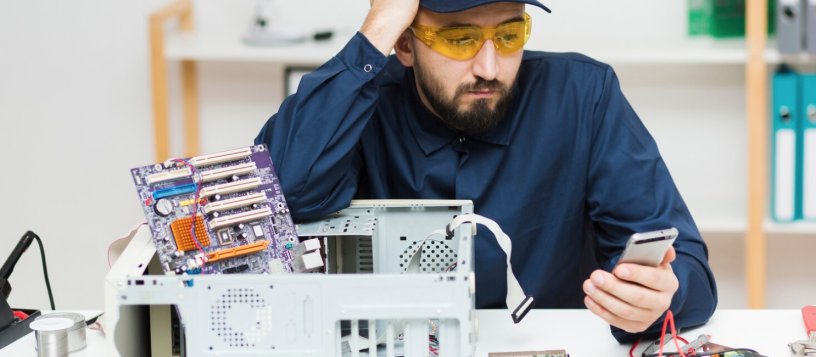Computers are essential tools in both personal and professional life, but they don’t always run smoothly. Over time, they can develop issues that affect their performance. Whether you’re dealing with a laptop or desktop, recognizing the early signs that your computer needs repair can save you from bigger problems down the road. Here are the top five signs your computer may need a repair and tips on how to spot them.
1. Slow Performance
One of the most common complaints users have is a slow computer. While this can be normal as computers age, it’s important to distinguish between typical wear and tear and a sign of something more serious.
How to Spot It:
- Programs take longer to open or crash frequently.
- Websites take longer to load.
- Simple tasks, like typing or opening files, are sluggish.
What to Do:
If you’ve already tried basic fixes like restarting your computer, clearing the cache, and running antivirus software with no improvement, it may be time to check your computer’s hardware. A failing hard drive or insufficient RAM can cause your computer to slow down.
2. Frequent Crashes or Freezes
Another troubling sign is when your computer crashes or freezes regularly. If your computer unexpectedly shuts down, freezes during tasks, or shows the “blue screen of death” (on Windows), it’s an indicator that something is seriously wrong.
How to Spot It:
- Your computer randomly shuts down or restarts.
- Programs freeze and do not respond, requiring a forceful shutdown.
- The operating system crashes with an error screen.
What to Do:
Frequent crashes can be a sign of faulty hardware or software conflicts. Check for any recent software updates or driver issues, and if the problem persists, consider bringing your computer in for diagnostics to check for underlying hardware issues.
3. Strange Noises
Computers should generally run quietly, with only subtle fan sounds when they’re processing heavy tasks. If you start hearing unusual noises like grinding, clicking, or loud whirring, it could be a sign that something is wrong.
How to Spot It:
- A clicking or grinding sound coming from the hard drive.
- Loud, irregular fan noises.
- Whining or buzzing sounds that increase as the computer works harder.
What to Do:
Noises like these are often associated with hardware failures, especially the hard drive or cooling fan. If the issue is with the fan, your computer might be overheating, which could lead to damage to internal components. If it’s your hard drive, it may be nearing failure, so backing up data is crucial.
4. Overheating
Computers generate heat when running, but excessive overheating can be a sign of an internal issue. If your laptop or desktop feels hot to the touch or shuts down unexpectedly due to temperature, something could be blocking the airflow or the cooling system may be malfunctioning.
How to Spot It:
- Your computer feels excessively hot after prolonged use.
- The fans are running loudly or constantly.
- The system shuts down without warning due to overheating.
What to Do:
Overheating can be caused by dust buildup in the vents, a malfunctioning cooling fan, or degraded thermal paste between the CPU and heatsink. Cleaning the vents or replacing the thermal paste can help, but a professional repair may be needed if the problem persists.
5. Connectivity Issues
Wi-Fi or Bluetooth problems can also signal that something’s not working properly. If your computer is unable to connect to the internet, frequently loses its connection, or has issues detecting Bluetooth devices, it might indicate a malfunctioning network card or software conflicts.
How to Spot It:
- Your Wi-Fi connection is slow or keeps dropping.
- The computer won’t detect Bluetooth devices or has trouble pairing with them.
- You can’t connect to the internet even after restarting your modem or router.
What to Do:
Make sure your network drivers are up to date, and check that there are no issues with your router or network settings. If the issue persists, you may need a replacement network card or further troubleshooting from a professional.
Conclusion
Recognizing these common signs early on can help you avoid bigger problems and expensive repairs down the line. If you notice any of the issues mentioned above, don’t wait too long to address them. Taking action as soon as possible can save your valuable data and extend the life of your computer. If you’re unsure about any of these symptoms or don’t feel comfortable fixing them yourself, it’s always a good idea to reach out to a professional for a diagnostic assessment and repair.








3 Comments
-

-

-

Lautaro Martinez
February 27, 2023We denounce with righteous indignation and dislike men who are so beguiled and demor alized by the charms of pleas ure of theobti moment blinded by eque qui is dolor
Lautaro Martinez
February 27, 2023Tortor montes platea iacu lis posuere per mauris, eros porta blandit curabitur ullamcorper varius
Karim Benzema
February 27, 2023We denounce with righteous indignation and dislike men who are so beguiled and demor alized by the charms of pleas ure of the moment